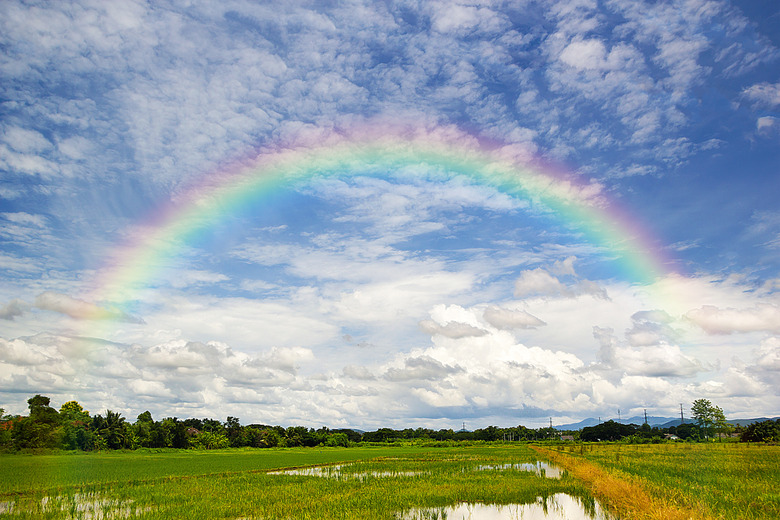What Are The Colors In The Rainbow?
A rainbow is the stuff of endless poetry. It's a visual phenomenon that never seems to lose its magic no matter how many times you have seen one of these grand, multi-colored arches in the sky before. You have probably noticed that they seem to almost always occur in the presence of rain, but not heavy rain. You have perhaps also noticed that, while every one might be a little different in overall appearance, each displays the same overall familiar color scheme.
The colors of the rainbow are caused by a combination of refraction (bending) and reflection (bouncing) of the sun's light by water droplets in the atmosphere. Also, the angles of the light rays reaching your eyes from the points at which they encounter the water droplets have to be within a certain range, and they must be the right distance away from you.
If you're getting the sense that there is more to rainbows than pretty colors, read on!
Finding a Rainbow
Finding a Rainbow
The best time to spot a rainbow is right after a rainstorm has just ended. This is because during the storm itself, clouds tend to block the sun's light (though if the sun is able to break through in the right spot, this limitation disappears), and soon after the storm ends, the water droplets that have not fallen to Earth in the form of rain evaporate quickly.
Because you need the reflected sunlight to come right toward you, the sun itself should be more or less behind you. This means that you should be able to see the shadow of your own head, and it should appear in the same general spot any rainbow does.
- The required angle of the sun against the droplets means that times close to noon are usually out the window for seeing a rainbow; if you look straight up during rainfall, chances are excellent that you will be looking right at the underside of a cloud!
The Causes and Colors of a Rainbow
The Causes and Colors of a Rainbow
The rainbow colors most commonly given include the following seven distinct hues: **Red, orange, yellow, green, blue, indigo and violet.** The red is on the outside of the arch. This is easily remembered using the old mnemonic "Roy G. Biv," but feel free to come up with your own fun memorization device.
The reason for the range of colors is the refraction of the "white light" from the sun upon entering the droplet. The sunlight "contains" a mix of all visible colors of the spectrum, which looks white in its native form. The edge of the droplet acts as a prism, and the light is broken into a continuum of wavelengths spanning the visible light spectrum (about 440 nanometers to 700 nanometers (nm), or 4.4 to 7 × 10-7 m.
These rays are reflected off a different side of the droplet from the one on which they entered, and they take a range of different angles to your waiting eyes, accounting for the different wavelengths, and hence colors, perceived in your brain. Not true magic but pretty magical anyway!
Primary and Secondary Rainbows
Primary and Secondary Rainbows
Sometimes, you will see, or think you see, a second faint rainbow hovering over the first. Is this an illusion? Not at all. In fact, what is happening in these cases is that a second reflection inside the falling water droplets creates a secondary rainbow that appears to be about 10 degrees of arc above the first one (about one-tenth of a right angle, or the angular distance from the horizon to directly overhead.
Because of the optics involved in the greater angle of reflection in secondary rainbows with respect to an observer, the color scheme is inverted; that is, the red coloration is on the inner side of the rainbow.
Cite This Article
MLA
Beck, Kevin. "What Are The Colors In The Rainbow?" sciencing.com, https://www.sciencing.com/colors-rainbow-8388948/. 9 February 2020.
APA
Beck, Kevin. (2020, February 9). What Are The Colors In The Rainbow?. sciencing.com. Retrieved from https://www.sciencing.com/colors-rainbow-8388948/
Chicago
Beck, Kevin. What Are The Colors In The Rainbow? last modified March 24, 2022. https://www.sciencing.com/colors-rainbow-8388948/
